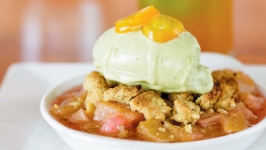Local Pantry: Rhubarb
Q: Can you really preserve your own food if you have a modern (read: busy) schedule?
A: No doubt about it, preserving food takes time.
But it doesn’t always have to be a lot of time. There are projects that can be accomplished in a jiffy. While you might not always have the chunk of time you want to put up a year’s worth of tomatoes, there are other preserving methods at your fingertips that can help you keep your pantry stocked. Here are a few quick preserving ideas for when you have more produce than time:
• Freeze it. Frozen fruits, such as berries, can be added directly to recipes without defrosting. You can also save up your berries and turn them into sweet spreads and more, later in the season.
• Dry it. Ten minutes is all it takes to run a piece of thick string through the stems of a couple pounds of chile peppers. Let them dry, and you will have spice all year long.
• Chill it. Vegetables such as cucumbers, carrots, turnips, kohlrabi, radishes, and zucchini make terrific refrigerator pickles. Submerge them under your favorite brine and they will keep in the fridge for at least three weeks.
RHUBARB
Sometimes you want to have unsweetened rhubarb on hand to bake into pies and crumbles or to use in a savory recipe, such as a sauce for fish. Freezing the chopped stalks allows you to stock up, which is important for those of us who see rhubarb come around just once a year.
Cooking rhubarb softens it almost instantly, so there really isn’t much of a fall-off in texture in the frozen fruit. Expect to add it to dishes where softened fruit is the goal, such as cobblers and pies, and the defrosted product will not disappoint.
Blanching is often recommended for rhubarb, but I find that it creates a solid “barb-berg” in the bag—the pieces, softened by the process, freeze together into a solid block. A better method is just to freeze it raw, so the pieces maintain their shape and flow freely from the bag.
FROZEN RHUBARB
Any quantity fresh rhubarb, stalks washed and trimmed
Prepare:
- Line several baking sheets with tea towels.
- Chop the rhubarb into 1-inch pieces and spread on the towels. Gather up the corners of each towel and toss the fruit in it to dry the cut edges.
- Arrange the fruit in a single layer on one or more baking sheets and freeze until solid, at least 4 hours but no more than 2 days to avoid freezer burn.
- Transfer the frozen rhubarb pieces to freezer bags or containers. They’ll keep in the freezer for up to 6 months.






